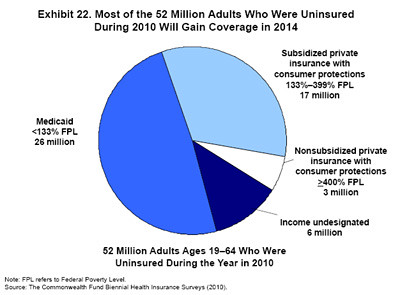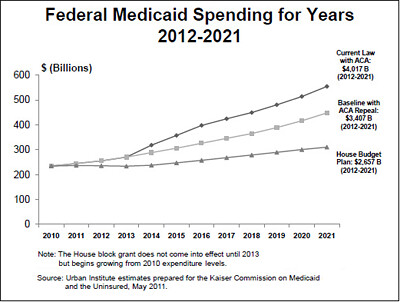As the debate over health care reform heated up in the fall of 2009, Tennessee Republican Senator Lamar Alexander called Medicaid "a medical ghetto" that "none of us, or any of our families, would ever want to be a part of for our health care." As it turns out, Alexander and his GOP colleagues were as wrong as they were cynical. A breakthrough study by the National Bureau of Economic Research (NBER) reveals that Medicaid recipients have far greater access to doctors, live healthier lives and enjoy more financial stability than those who must go without. Nevertheless, 98% of Congressional Republicans voted to gut Medicaid spending by over $1 trillion in the next decade and with it, add up to 44 million people to the ranks of the uninsured.
Currently, the $300 billion Medicaid program serves roughly 60 million Americans. On average, the federal government picks up 57% of the tab, with poorer states like Mississippi and Alabama getting 75% of the funding from Washington. Medicaid not only pays for a third of nursing home care in the United States; it covers a third of all childbirths. (In Texas, the figure is one-half.) As with Medicare, Medicaid provides insurance for substantially less than private insurers (27% less for children, 20% for adults.) Still, the likes of Senator Alexander and Rep. Virginia Foxx (R-NC) suggested that it is better to be uninsured than on Medicaid.
Not according to the NBER. The same nonpartisan group that determines the official beginning and end of recessions, NBER found, as Harvard researcher and former member of President George W. Bush's Council of Economic Advisers Katherine Baicker put it, "Medicaid matters."
The NBER study avoided the pitfalls of past studies by examining the case of Oregon. After Oregon in 2008 established a lottery to add 10,000 people to it limited Medicaid rolls, the NBER team interview 6,000 of the lucky ones and 6,000 of the 90,000 who lost out. The results were striking:
We find that in this first year, the treatment group had substantively and statistically significantly higher health care utilization (including primary and preventive care as well as hospitalizations), lower out-of-pocket medical expenditures and medical debt (including fewer bills sent to collection), and better self-reported physical and mental health than the control group.
The New York Times provided some of the details of the Medicaid success story:
Those with Medicaid were 35 percent more likely to go to a clinic or see a doctor, 15 percent more likely to use prescription drugs and 30 percent more likely to be admitted to a hospital. Researchers were unable to detect a change in emergency room use.
Women with insurance were 60 percent more likely to have mammograms, and those with insurance were 20 percent more likely to have their cholesterol checked. They were 70 percent more likely to have a particular clinic or office for medical care and 55 percent more likely to have a doctor whom they usually saw.
The insured also felt better: the likelihood that they said their health was good or excellent increased by 25 percent, and they were 40 percent less likely to say that their health had worsened in the past year than those without insurance.
As Ezra Klein of the Washington Post summed up the findings, "knowing that Medicaid matters is good, but we already sort of knew that." But back in Washington, in response to that self-evident truth, Democrats and Republicans have drawn contradictory lessons and offered diametrically opposed plans for the future.
By extending Medicaid coverage to families earning up to 133% of the poverty level, starting in 2014 the Affordable Care Act passed by Democrats in Congress will bring insurance to millions more Americans. A March study by the Commonwealth Fund revealed that revealed that when fully implemented, the ACA will bring relief to "nearly all of the 52 million working-age adults who were without health insurance for a time in 2010."
Not if the Republicans get their way.
With the passage of the Ryan 2012 budget proposal, Republicans voted to slash Medicaid funding by $1 trillion over 10 years while sending the remaining dollars as block grants to the states. As it turns out, that gambit would not only repeal the 2010 Affordable Care Act law, but guarantee than millions of low income Americans are deprived of health care.
In its latest state-by-state analysis, the Kaiser Family Foundation detailed the devastating impact of the budget backed by 235 House Republicans and 40 GOP Senators:
Projected federal spending on Medicaid for the 10-year period 2012 to 2021 would fall by $1.4 trillion, a 34 percent decline. By 2021, states would receive $243 billion less annually in federal Medicaid money than they would under current law, a 44 percent reduction.
The effect on enrollment in state Medicaid programs could vary widely. By 2021, between 31 million and 44 million fewer people nationally would have Medicaid coverage under the House Budget Plan relative to expected enrollment under current law, the analysis finds, examining three possible scenarios using different assumptions about how states might respond to lower federal funding. Most of those people, given their low incomes and few options for other coverage, would end up uninsured.
The House Budget Plan also could affect health centers, hospitals and safety-net facilities that serve low-income and uninsured people and rely heavily on Medicaid revenues. By 2021, hospitals could see reductions in Medicaid funding of between 31 percent and 38 percent annually, or as much as $84.3 billion, under the plan compared with projected funding under current law. The reductions would come at a time when millions more people would lack coverage, increasing the potential demand for uncompensated hospital care.
As Jonathan Cohn explained, the Republicans' health care havoc hardly ends there. While Paul Ryan's draconian budget cuts would mortally wound Medicaid, block grants in the hands of Republican Governors like Rick Perry, Chris Christie, Rick Scott, Haley Barbour and Jan Brewer would be the final nail in the coffin:
If the law changes and Medicaid becomes a block grant, then every year the federal government would simply give the states a lump sum, set by a fixed formula, and let the states make the most of it. Conservatives claim block grants would give states the flexibility they need to make their programs more efficient. But, as Harold Pollack has noted in these pages, states already have some flexibility. And because demand for Medicaid tends to peak during economic downturns, when state tax revenues fall, the likely impact of a block grant scheme would be to make Medicaid even less affordable at the time it is most necessary.
That's not to say plenty of governors wouldn't take advantage of block grant status to change their Medicaid programs in ways they cannot now. They surely would--by capping enrollment, thinning benefits, increasing co-payments, and so on.
Which is exactly what they are already doing now. Ezra Klein summed up the findings from a recent joint study by the Kaiser Family Foundation and the Bipartisan Policy Center:
Twenty states implemented benefit restrictions in the past year. In fiscal year 2010, 39 states implemented Medicaid provider rate cuts or freezes (up from 33 in fiscal year 2009), and 37 states have provider rate restrictions planned for the next fiscal year.
And as the New York Times and USA Today recently reported, the end of the Obama stimulus assistance is putting the Medicaid programs in already cash-strapped states on the brink of crisis. Despite the high recession-induced demand for health care services, the Times noted:
From New Jersey to California, state officials are bracing for the end to more than $90 billion in federal largess specifically designated for Medicaid. To hold down costs, states are cutting Medicaid payments to doctors and hospitals, limiting benefits for Medicaid recipients, reducing the scope of covered services, requiring beneficiaries to pay larger co-payments and expanding the use of managed care...
The Congressional Budget Office estimates that federal Medicaid spending will decline in 2012 for only the second time in the 46-year history of the program. But states say they will have to have to spend more on Medicaid as they struggle to make up for the loss of federal money.
Just how bad it could get is revealed by a recent survey by the National Association of State Budget Officers, which revealed that 24 states are reducing Medicaid payments to providers, while 20 are limiting benefits in some way.
Sadly, Medicaid spending is one of the items President Obama put on the table in his quixotic quest for a budget compromise with Congressional Republicans. While public support for Medicare may help American seniors withstand the Republican assault, Medicaid recipients probably won't be so fortunate. As the Washington Post's Klein was among the first to report, "Debt negotiators [are] focusing on Medicaid." All of which prompted West Virginia Democratic Senator and chairman of the Senate Finance Subcommittee on Health Care Jay Rockefeller to lament:
"Medicaid is very much on the chopping block. Seniors vote. But if you are poor and disabled, you might not vote, and if you are a child, you do not vote -- that's a lot of Medicaid's population. They don't have money to do lobbying."
Should that come to pass, the result would be an American tragedy. After all, as Harvard economist and NBER study co-author Katherine Baicker explained, "what we've learned is Medicaid matters."
(This piece also appears at Perrspectives.)






















